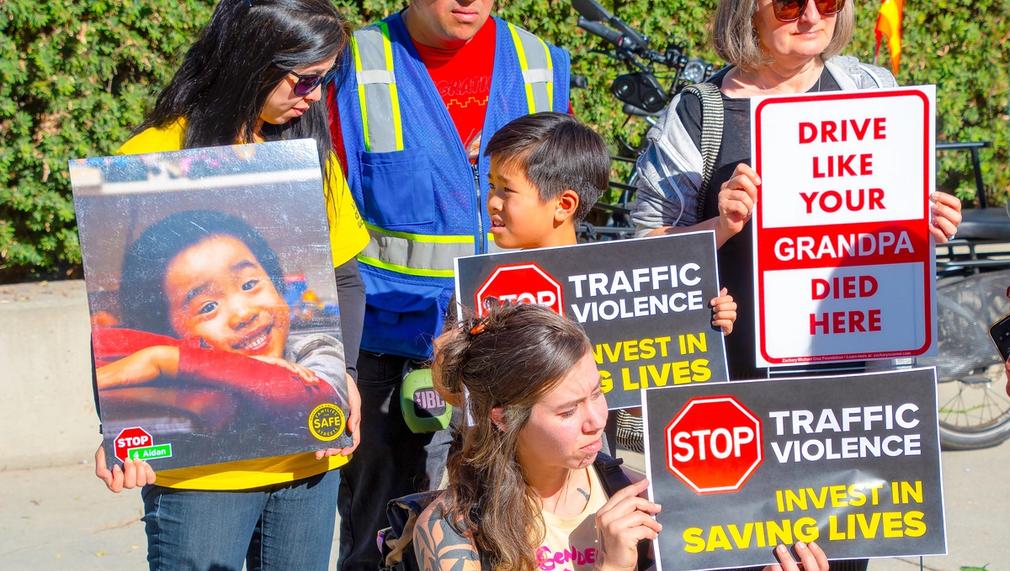SAFE Support x LAPD: Redefining Post-Collision Care
This grant will fund a first-of-its-kind pilot between Streets Are For Everyone and LAPD to revolutionize how Los Angeles responds to traffic violence victims. Through bilingual, trauma-informed case management, and led by an RN, SAFE will provide emotional support; mental health, medical and legal navigation; and resource connection, relieving officers from non-criminal social duties while ensuring no victim faces trauma, grief, or bureaucracy alone.

What is the primary issue area that your application will impact?
Health care access
In which areas of Los Angeles will you be directly working?
South LA City of Los Angeles (select only if your project has a citywide benefit)
In what stage of innovation is this project, program, or initiative?
Applying a proven solution to a new issue or sector (using an existing model, tool, resource, strategy, etc. for a new purpose)
What is your understanding of the issue that you are seeking to address?
In 2021, in response to protests and evidence of systemic racism in traffic enforcement, the LA City Council directed LAPD to reduce non-essential interactions with the community. As a result, LAPD stopped responding to most traffic collisions, instead directing injured survivors to fill out confusing online forms. This resulted in a significant drop in the number of collision reports filed, while the number of traffic fatalities, which LAPD still responds to, skyrocketed to 336 in 2023.
Traffic collision reports are required to file insurance claims to help cover damages, medical care, and mental health care. While LAPD often refers other victims of violent crimes to non-profits specialized in supporting their needs, victims of traffic are left to fend for themselves.
Additionally, this drop in collision reporting hindered LA DOT’s efforts to analyze and implement road safety improvements that could prevent future traffic collisions, serious injuries, and fatalities.
Describe the project, program, or initiative this grant will support to address the issue.
To address this gap in health-care access, the initiative we are working to implement is a first-of-its-kind strategy to revolutionize how LA responds to traffic violence victims.
This would start as a 12-month pilot partnership between LAPD and SAFE to assist any victim of non-criminal traffic violence in South LA. Traffic violence due to criminal actions (most fatalities, DUIs, stolen vehicles, etc.) would still be handled by city services such as the LA City Victims Assistance Program.
Primary duties would include assistance in filling out LAPD’s online traffic collision forms. Trained bilingual case workers and nurses would then look for any resource gaps, untreated physical issues, and acute mental health problems as a result of, or exacerbated by, recent traffic violence.
Based on nine years of experience and resources developed by our existing victim support program, called SAFE Support, they would assist survivors with these issues. This help is provided at no cost to the victims and with no time limit. The initiative would be managed under our existing victim support program, which is led by an RN.
Many of those whom SAFE Support is already assisting are immigrants or members of equity-focused communities in South LA. These community members are more commonly vulnerable road users—pedestrians, cyclists, and public transit users.
This initiative would relieve officers from non-criminal social duties while ensuring no victim faces trauma, grief, or bureaucracy alone.
Describe how Los Angeles County will be different if your work is successful.
This pilot will redefine how victims of traffic violence are cared for, not as statistics, but as real people. Survivors will no longer be left to navigate physical trauma, grief, bureaucracy, and confusion alone. Traffic detectives will no longer have to act as social workers but will have more time to do what they’re trained to do.
Post-trauma care is one of the priority pillars for the CA Office of Traffic Safety, and they have expressed interest in funding the expansion of this program, but they want to see a successful pilot first. With future OTS funding, we envision SAFE Support becoming a permanent resource embedded across all LAPD Traffic Divisions, creating a citywide safety net for all crash survivors, regardless of language, income, or immigration status.
This pilot would set a precedent for SAFE Support to be implemented in other law enforcement agencies in LA County and across the state, effectively changing forever how traffic violence victims are treated.
Approximately how many people will be impacted by this project, program, or initiative?
Direct Impact: 250
Indirect Impact: 1,500